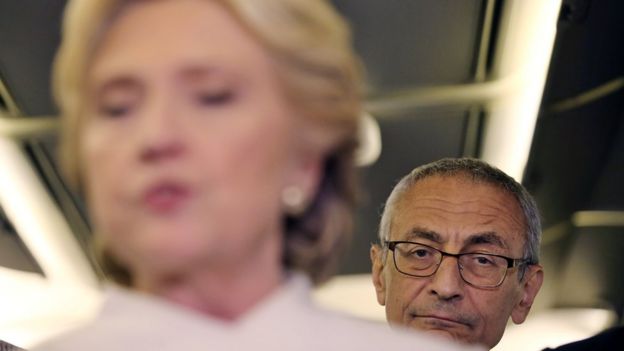
This article is more than
9 year old"They need to either stop talking about this or finally present some sort of proof," Russian President Vladimir Putin's spokesman said.
US President Barack Obama has vowed to take action against Russia for its alleged interference in the US presidential election campaign.
"We need to take action and we will," he told US public radio network NPR.
Russia stands accused by the US of hacking the emails of the Democratic Party and a key Hillary Clinton aide, which the Kremlin strongly denies.
Republican President-elect Donald Trump has also dismissed the claim as "ridiculous" and politically motivated.

The intelligence agencies say they have overwhelming evidence that Russian hackers linked to the Kremlin were behind the hacks.
On Thursday, a White House spokesman said President Vladimir Putin was involved in the cyber-attacks.
Hours later, Mr Obama said: "I think there's no doubt that when any foreign government tries to impact on the integrity of our elections, that we need to take action and we will, at a time and a place of our own choosing.
"Some of it may be explicit and publicised. Some of it may not be.
"Mr Putin is well aware of my feelings about this, because I spoke to him directly about it."
It is not clear what action the US intends to take, with Mr Obama leaving office on 20 January.
The disclosure of emails was embarrassing to the Democratic Party at a crucial point in the election campaign.
The CIA has concluded that Russia's motivation was to sway the election in favour of Mr Trump, but no evidence has been made public.
On Thursday, John Podesta, whose emails were hacked as headed Mrs Clinton's campaign in October and November, criticised the FBI's response to the alleged Russian hacking.
"Comparing the FBI's massive response to the overblown email scandal [over Mrs Clinton's use of a private email server] with the seemingly lackadaisical response to the very real Russian plot to subvert a national election shows that something is deeply broken at the FBI," he wrote in an opinion piece in the Washington Post.
18 revelations from Wikileaks emails
Also on Thursday, a security firm said a Russian-speaking hacker had penetrated systems at the US agency which certifies voting systems .
In early December, the hacker tried to sell more than 100 login credentials from the US Election Assistance Commission, the firm Recorded Future said.
The company said its researchers discovered the breach when monitoring underground electronic markets, and posed as a potential buyer to engage the hacker in conversation, before alerting law enforcement agencies.
Mr Trump has accused the Democrats of fabricating Russian involvement to hide their embarrassment at the election defeat.
He has also long expressed admiration for Mr Putin, and his pick for secretary of state - oil tycoon Rex Tillerson, who has worked closely with the Russian leader - has raised concerns.
The president-elect has been assembling his new administration and on Thursday he said he would pick lawyer David Friedman to be his ambassador to Israel.
Democrats have struggled to grasp why Hillary Clinton lost. Could it be the spread of "fake news"? A poor Democratic ground game in Midwestern states? FBI Director James Comey's last-minute letter to Congress about new Clinton emails?
Russian government hackers are the latest culprit - or scapegoat, depending on one's perspective. A wily Vladimir Putin overseeing damaging leaks makes for a deliciously villainous plot.
Of course those campaign emails, while certainly an annoyance to Democrats, likely weren't enough to tilt the election. But that doesn't mean these revelations won't be a headache for a president-elect who bristles when challenged.
Now he's feuding with his own intelligence services and lashing out on Twitter, virtually guaranteeing more leaks. A congressional investigation seems likely. There's even talk of a Russian sanctions bill ending up on President Trump's desk.